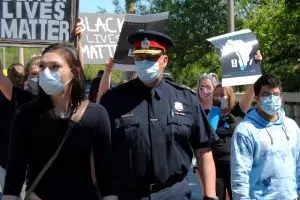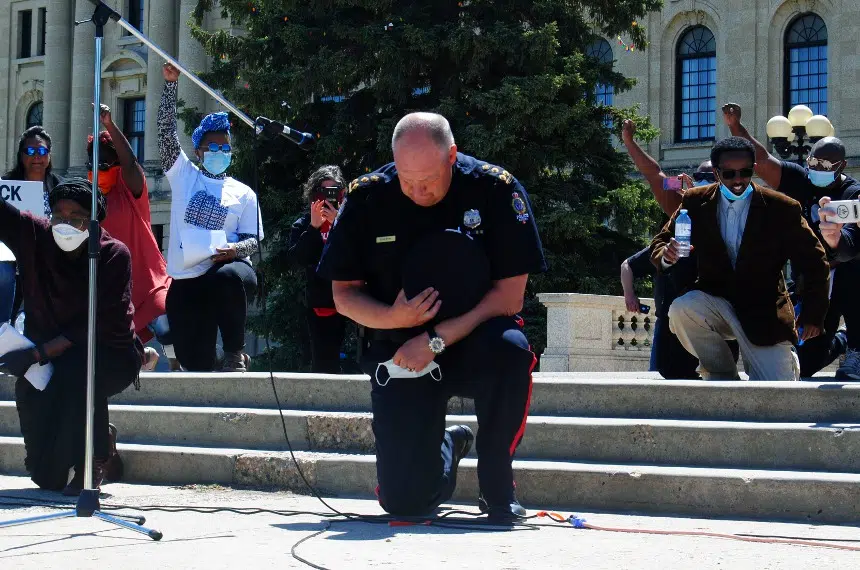Signs reading “Black Lives Matter” and chants of “I can’t breathe” filled the air around Wascana Lake again Friday morning as protesters returned to the grounds in front of the legislative building.
This time they marched from the Royal Saskatchewan Museum to the legislature along Albert Street, with all kinds of vehicles honking their support along the way.
There were fewer protesters on Friday than there were on Tuesday, but this time there were several uniformed police officers in the crowd, taking part in the march.
Regina Police Chief Evan Bray was there as well with his family. He was brought up to the microphone during the rally.
“I’m sickened and saddened by that same video, that same disgraceful act that we’re all here today to stand up against,” said Bray.
In his speech, Bray acknowledged there’s racism in the community, in the police service, and in the system itself.
“I recognize I have white privilege, I can’t change it, but I can use it.”
Bray said he and the other officers there promised to use their positions to combat racism.
“I feel the need to say that I’m sorry, because I am sorry that that happened. That tragic, senseless killing happened. And it’s a very tough position that I find myself in and I think police officers do, because I’m very proud of the job that we do and the important role we play in the community, but I’m not proud of the events that I see unfolding, not just in the United States, but in Canada.”
The crowd cheered many of the points in Bray’s speech with only a few shouts of things like “what are you going to do?”
Bray ended his speech by asking his fellow police officers to take a knee with him for 30 seconds, to demonstrate their commitment. The rest of the crowd followed suit.

Regina police chief Evan Bray walks with protestors at a Black Lives Matter rally in Regina. Jun. 5, 2020 (Lisa Schick/980 CJME)
Speaking afterward, Bray said this is a tough conversation to have as a police service, but that can make for meaningful change and they need to be prepared to embrace that. He said this is an important time to listen.
“It’s not about being defensive, it’s not about being frustrated as a police service, it’s about understanding that there are challenges in this community, some of which the police are directly involved in.”
Bray talked about what the police service is already doing to fight racism and the potential for excessive use of force. He said they have screening processes to try to stop racism from creeping into the police service and they have ongoing training for officers.
“We spend a lot of time and effort to try and make sure that we train and educate our members so that if there is – oftentimes racism is born from ignorance and not understanding, and so whether it be education or use of force training or de-escalation training, the real aggressive work that we do at the recruit level before we hire people, that sort of work has to continue,” said Bray.
There are also things Bray mentioned that could still be done to improve things, like having a civilian oversight committee in the province to investigate when there’s a death or serious injury in police custody. Bray said Saskatchewan is one of the few provinces which doesn’t have such a committee, and the province’s chiefs of police have said they’ll embrace anything that builds trust and transparency in the community.
Bray said he’s also interested in exploring a multicultural advisory council for the police service which would include people of different backgrounds and generations.
“I know that boards of that nature do exist in some places in Canada and I think that would be very powerful”
Bray said he can’t control everything in the world, but he can control the police service and the direction they’re going with this.
“I am committed to always working to end racism from, not only my chair personally as a citizen of this city, but as chief of police,” said Bray.











